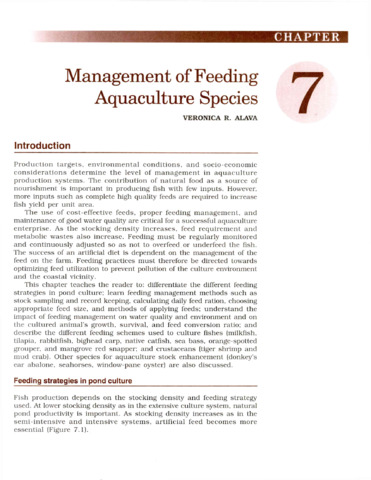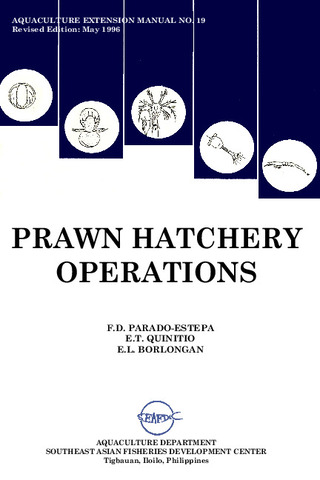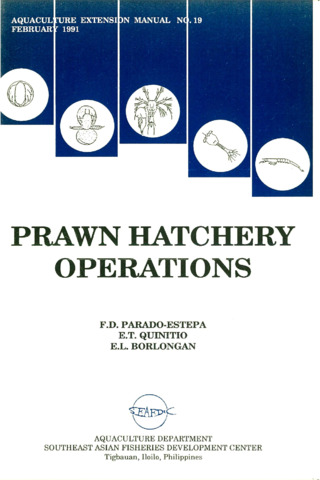Status on development and use of alternative dietary ingredients in aquaculture feed formulations in Viet Nam
- Global styles
- MLA
- Vancouver
- Elsevier - Harvard
- APA
- Help

Date
2015Author
Page views
14,034ASFA keyword
AGROVOC keyword
Taxonomic term
Metadata
Perlihat publikasi penuh
Share
Abstract
This paper reviewed fish catch production and estimated demand of aquafeed, fish meal, fish oil, soybean meal in Viet Nam for year 2013. Fish catch production was around 2.8 million metric tons (mt) while marine fish production was 1.9 million mt. Estimated marine trash fish production was 0.8 million mt with over 100 species including the dominant species anchovy (Stolephorus spp.), lizard fish (Saurida spp.) and pony fish (Leistognathus spp.).
Approximately 0.5 million mt of marine trash fish was used for livestock, aquaculture and fish meal. Local marine fish meal consisting of protein content from 50 to 68% and catfish byproduct meal containing protein level from 50 to 60% were available. Based on FCR values of 5 major species including catfish, black tiger shrimp, white leg shrimp, Asian seabass, and snake head, aquafeed production was estimated at around 2.5 million mt. Marine fish oil/squid liver oil requirement was from 15.5 to 31 thousand mt. Fish meal demand was from 252 and 430 thousand mt. Almost all fish meal and marine fish oil used in aquafeed were imported.
Moreover, soybean and other plant ingredients are potential alternative sources to replace fish meal and fish oil. Vietnamese farmers produced 168 thousand mt soybean while soybean demand amounts for aquafeed were from 693 to 1,140 thousand mt. In 2013, feedmills imported approximately 3 million mt of soybean meal (cake) from many countries in the world. Some other plant protein sources which were also imported, have good nutrient profiles but they contain some anti-nutritional factors.
In the future, research on replacement of fish meal and fish oil with plant and animal by-product sources and feed additives for aquafeed should be studied. In particular, the management of local fish meal plants and capture fishery should be improved.
Suggested Citation
Tuan, V. A. (2015). Status on development and use of alternative dietary ingredients in aquaculture feed formulations in Viet Nam. In M. R. Catacutan, R. M. Coloso, & B. O. Acosta (Eds.), Development and Use of Alternative Dietary Ingredients or Fish Meal Substitutes in Aquaculture Feed Formulation : Proceedings of the ASEAN Regional Technical Consultation on Development and Use of Alternative Dietary Ingredients or Fish Meal Substitutes in Aquaculture Feed Formulation, 9-11 December 2014, Nay Pyi Taw, Myanmar (pp. 41-48). Tigbauan, Iloilo, Philippines: Aquaculture Department, Southeast Asian Fisheries Development Center.
Type
Conference paperISBN
9789719931058
Related items
Showing items related by title, author, creator and subject.
-
Management of feeding aquaculture species
Alava, Veronica R. (Aquaculture Department, Southeast Asian Fisheries Development Center, 2002)This chapter teaches the reader to: differentiate the different feeding strategies in pond culture; learn feeding management methods such as stock sampling and record keeping, calculating daily feed ration, choosing ... -
Series: Aquaculture extension manual; No. 19
Prawn hatchery operations
Parado-Estepa, Fe D.; Quinitio, Emilia T. ; Borlongan, Emeterio L. (Aquaculture Department, Southeast Asian Fisheries Development Center, 1996-05)
The manual, an updated version of the 1984 SEAFDEC/AQD manual, presents the underlying principles and step-by-step instructions of prawn larval and post-larval rearing. The techniques described are not only applicable to ...
; Borlongan, Emeterio L. (Aquaculture Department, Southeast Asian Fisheries Development Center, 1996-05)
The manual, an updated version of the 1984 SEAFDEC/AQD manual, presents the underlying principles and step-by-step instructions of prawn larval and post-larval rearing. The techniques described are not only applicable to ... -
Series: Aquaculture extension manual; No. 19
Prawn hatchery operations
Parado-Estepa, Fe D.; Quinitio, Emilia T. ; Borlongan, Emeterio L. (Aquaculture Department, Southeast Asian Fisheries Development Center, 1991-02)
The manual, an updated version of the 1984 SEAFDEC/AQD manual, presents the underlying principles and step-by-step instructions of prawn larval and post-larval rearing. The techniques described are not only applicable to ...
; Borlongan, Emeterio L. (Aquaculture Department, Southeast Asian Fisheries Development Center, 1991-02)
The manual, an updated version of the 1984 SEAFDEC/AQD manual, presents the underlying principles and step-by-step instructions of prawn larval and post-larval rearing. The techniques described are not only applicable to ...






